
El Nuevo Día is the newspaper with the largest circulation in Puerto Rico. It was founded in 1909 in Ponce, Puerto Rico, and today it is a subsidiary of GFR Media. Its headquarters are in Guaynabo, Puerto Rico.

Puck was the first successful humor magazine in the United States of colorful cartoons, caricatures and political satire of the issues of the day. It was founded in 1876 as a German-language publication by Joseph Keppler, an Austrian-born cartoonist. Puck's first English-language edition was published in 1877, covering issues like New York City's Tammany Hall, presidential politics, and social issues of the late 19th century to the early 20th century.
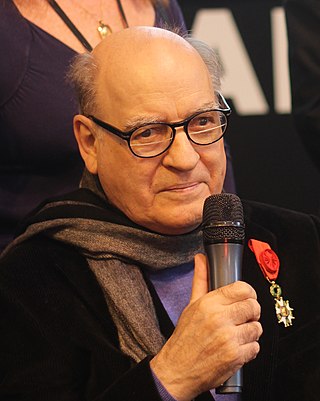
Joaquín Salvador Lavado Tejón, better known by his pen name Quino, was an Argentine cartoonist. His comic strip Mafalda is popular in many parts of the Americas and Europe and has been praised for its use of social satire as a commentary on real-life issues.

El País is a Spanish-language daily newspaper in Spain. El País is based in the capital city of Madrid and it is owned by the Spanish media conglomerate PRISA.
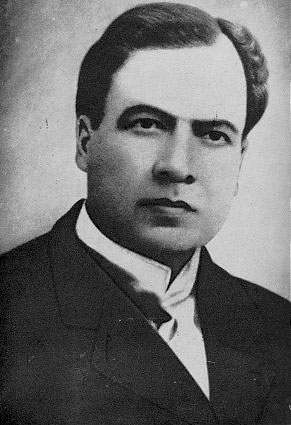
Félix Rubén García Sarmiento, known as Rubén Darío, was a Nicaraguan poet who initiated the Spanish-language literary movement known as modernismo (modernism) that flourished at the end of the 19th century. Darío had a great and lasting influence on 20th-century Spanish-language literature and journalism. He has been praised as the "Prince of Castilian Letters" and undisputed father of the modernismo literary movement.

A newspaper of record is a major national newspaper with large circulation whose editorial and news-gathering functions are considered authoritative and independent; they are thus "newspapers of record by reputation" and include some of the oldest and most widely respected newspapers in the world. The level and trend in the number of "newspapers of record by reputation" is regarded as being related to the state of press freedom and political freedom in a country.

Le Soir is a French-language Belgian daily newspaper. Founded in 1887 by Emile Rossel, it was intended as a politically independent source of news. It is one of the most popular Francophone newspapers in Belgium, competing with La Libre Belgique, and since 2005 has appeared in Berliner format. It is owned by Rossel & Cie, which also owns several Belgian news outlets and the French paper La Voix du Nord.

The San Diego Union-Tribune is a metropolitan daily newspaper published in San Diego, California, that has run since 1868.
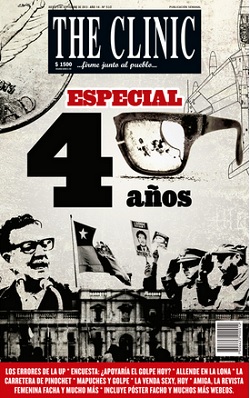
The Clinic is a partly satirical Chilean newspaper that offers analysis and opinion on politics, culture, and current affairs. The newspaper was founded by Patricio Fernández Chadwick in November 1998. The paper includes a wide mix of cultural criticism, jokes, in-depth interviews, and investigative work. The name was inspired by Chilean dictator Augusto Pinochet's October 1998 arrest in Britain at The London Clinic, which bears the name The Clinic on its façade. In its first incarnation, it was only a few pages long, distributed only within Santiago, and costing 100 pesos. Over the years, it has changed drastically, and in 2013 cost 1000 pesos and averages forty pages. Today, it is published every Thursday during normal operation times. It published its 499th edition on June 20, 2013 and 900th edition by October 6, 2022.

José Manuel Emiliano Balmaceda Fernández served as the 10th President of Chile from September 18, 1886, to August 29, 1891. Balmaceda was part of the Castilian-Basque aristocracy in Chile. While he was president, his political disagreements with the Chilean congress led to the 1891 Chilean Civil War, following which he shot and killed himself.
PM was a liberal-leaning daily newspaper published in New York City by Ralph Ingersoll from June 1940 to June 1948 and financed by Chicago millionaire Marshall Field III.
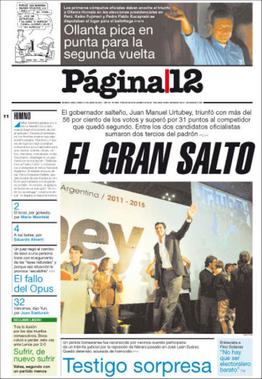
Página 12 is a newspaper published in Buenos Aires, Argentina. It was founded on 25 May 1987 by journalist Jorge Lanata and writers Osvaldo Soriano and Alberto Elizalde Leal. Since 2016 the newspaper is property of Grupo Octubre, a multimedia company created by Víctor Santa María, president of the Justicialist Party in the Buenos Aires.
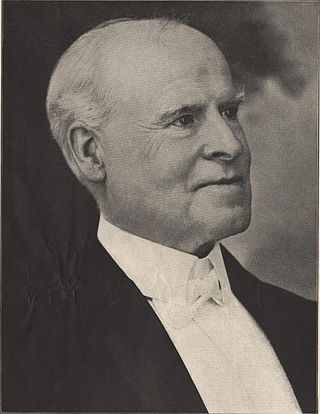
John Wilson Bengough was one of Canada's earliest cartoonists, as well as an editor, publisher, writer, poet, entertainer, and politician. Bengough is best remembered for his political cartoons in Grip, a satirical magazine he published and edited, which he modelled after the British humour magazine Punch. He published some cartoons under the pen name L. Côté.

The Corvallis Gazette-Times is a daily newspaper for Corvallis, Oregon, United States. The newspaper, along with its sister publication, the Albany Democrat-Herald of neighboring Albany, Oregon, is owned by Lee Enterprises of Davenport, Iowa.

El Fagr is an Egyptian independent weekly newspaper, based in Cairo.

The Front for Victory was a centre-left Peronist electoral alliance in Argentina, and is formally a faction of the Justicialist Party. Former presidents Néstor Kirchner and Cristina Fernández de Kirchner were elected as representatives of this party.
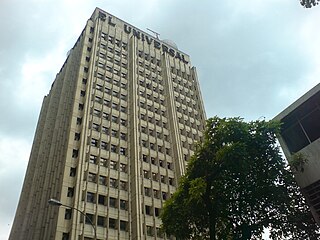
El Universal is a major Venezuelan newspaper, headquartered in Caracas. El Universal is part of the Latin American Newspaper Association, an organization of leading newspapers in Latin America. Its main rival is El Nacional. The newspaper does not disclose circulation figures.
Argentine comics are one of the most important comic traditions internationally, and the most important within Latin America, living its "Golden Age" between the 1940s and the 1960s. Soon after, in 1970, the theorist Oscar Masotta synthesized its contributions in the development of their own models of action comics, humor comics and folkloric comics and the presence of other artists.

Olé is an Argentine national daily sports newspaper published in Buenos Aires. The publication was launched on May 23, 1996, by the Clarín Group. It has since become the most important sports publication in Argentina, especially since the closing of El Gráfico in 2002. Shortly after its establishment, the publication received three awards from the Society for News Design (1997).
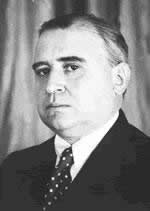
Natalio Félix Botana Miralles, was an Uruguayan journalist and entrepreneur who founded the Argentine newspaper Crítica in 1913. Published until 1962, Crítica was the most widely circulated newspaper in Latin America.



























